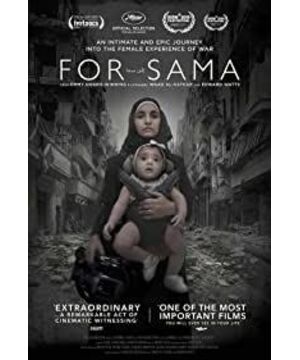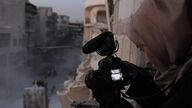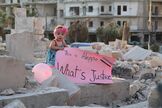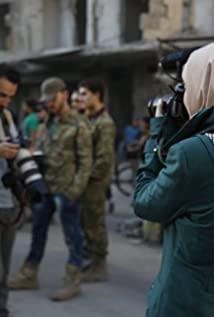"For Sama", a controversial documentary.
I have seen a lot of speculations about the photographer's true intentions and political positions, and derived some ideas from them, and write some humble opinions.
Most of the shots in the whole film recorded the horrors of war by the creator directly in hand-held form, the fragmented powerlessness, and the panic of inverting the lens. It is a documentary, but also a "documentary." Compared with the artistry of movies, what stands out is the authenticity of news-like primary materials.
An uneasy atmosphere permeated under the bombed Aleppo wall. The blood and corpses all over the floor seemed to be accustomed to the scene. A blue cloth and half a bundle of white rope became the tomb of the dead boy. I remember a boy who survived said to his dead friends:
"May God forgive them for leaving me here alone"
How this is a world more terrifying than death.
But in such a world, people still cheer for the birth of the newborn, and occasionally a glimmer of hope flashes in the almost desperate eyes. The old man played chess on the side of the ruined bricks, the children played in the desolation of the cannonball pit, and the bus that was burnt down halfway was used as a playground for games. Like ignorance, like helplessness, and the moment of having fun in suffering is like grasping the last trace of happiness in front of me. The love in the war and the life in the raging artillery fire always hit people's hearts directly.
Indeed, the film has a strong political attribute and is anti-Russian and anti-Syrian government. The photographer interprets the opposition's position from a weak point of view of "justice", and accuses the government of brutality with realistic cruelty. Everyone has their own position, and all countries, organizations and individuals will equate "self-identity" with "justice". But what exactly is justice? What's sad is that in reality, any party's perception of "justice" is bound to affect the other party, and disasters always exist. Regarding political metaphors, since they cannot be "reasoned", there is no criticism.
In this film, criticizing the narration and editing clumsy voices that point to impure motives makes it hard for people to agree with its fundamental intentions. Is it too ironic to use such films to discuss political stances and artistic pursuits?
There are indeed many shortcomings in the film, but whether it is from the reviews or the Oscar nomination this year, it reflects a larger status quo problem: audiences often measure a certain form of film against another. Such as applying the characteristics of realist narrative to formalism and criticizing its stylized false trivialities, or shifting the judging criteria of commercial films to judge documentaries, and then raising certain things brought about by the film. To the height of "political correctness."
If people become more and more critical of the techniques and technology of the film, and ignore the transmission of its true core meaning,
If the judgment of film art becomes more and more politically related, it will lose its purity due to its so-called "correctness".
That movie can no longer be called a movie,
Maybe it's called sad.
View more about For Sama reviews








